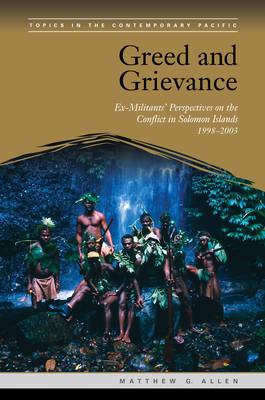
Door een staking bij bpost kan je online bestelling op dit moment iets langer onderweg zijn dan voorzien. Dringend iets nodig? Onze winkels ontvangen jou met open armen!
- Afhalen na 1 uur in een winkel met voorraad
- Gratis thuislevering in België vanaf € 30
- Ruim aanbod met 7 miljoen producten
Door een staking bij bpost kan je online bestelling op dit moment iets langer onderweg zijn dan voorzien. Dringend iets nodig? Onze winkels ontvangen jou met open armen!
- Afhalen na 1 uur in een winkel met voorraad
- Gratis thuislevering in België vanaf € 30
- Ruim aanbod met 7 miljoen producten
Zoeken
Greed and Grievance
Ex-Militants' Perspectives on the Conflict in Solomon Islands, 1998-2003
Matthew G Allen
€ 76,95
+ 153 punten
Omschrijving
This work offers important new perspectives on the violence and unrest that gripped Solomon Islands between late 1998 and mid-2003, a period known as the Ethnic Tension. Based on in-depth interviews and documents associated with the "Tension Trials," it is the first detailed account of the conflict that engages directly with the voices of the men who joined the rival militant groups. These contemporary voices are presented against the backdrop of the socioeconomic and cultural history of Solomon Islands.
The findings provide a refreshing corrective to the pervasive framing of the Isatabu uprising and the Malaitan response as essentially criminal and apolitical activities driven by the self-interest of those who participated in them. Alternative motives for the men who participated in the Solomons conflict are elucidated, foremost of which are their own conceptions of history and of the places of their respective peoples in the historical processes of colonization, development, and nation-building. Uneven development, relative deprivation and rapid socioeconomic and cultural change are highlighted as salient structural causes of the unrest.Specificaties
Betrokkenen
- Auteur(s):
- Uitgeverij:
Inhoud
- Aantal bladzijden:
- 264
- Taal:
- Engels
- Reeks:
Eigenschappen
- Productcode (EAN):
- 9780824838546
- Verschijningsdatum:
- 30/09/2013
- Uitvoering:
- Hardcover
- Formaat:
- Genaaid
- Afmetingen:
- 152 mm x 229 mm
- Gewicht:
- 539 g

Alleen bij Standaard Boekhandel
+ 153 punten op je klantenkaart van Standaard Boekhandel
Beoordelingen
We publiceren alleen reviews die voldoen aan de voorwaarden voor reviews. Bekijk onze voorwaarden voor reviews.











